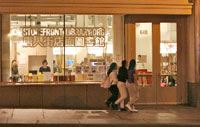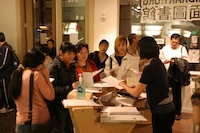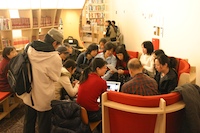 Dear Patrons, Supporters and Sponsors,
Dear Patrons, Supporters and Sponsors,
The last day of the Storefront Library at 640 Washington St. will be Sunday, January 17, 2010. If you haven’t had a chance to come by, please do! This weekend, in addition to storytime and a special science activity, we’ll be giving tours for the American Librarians’ Association Midwinter Conference.
Thank you to our host Archstone for extending the donation of the storefront space into 2010. The extension let us serve more patrons, gather more evaluation data, and capture the attention of librarians nationwide coming to Boston. We’re optimistic about what happens next—both for Chinatown and for other experiments in the model of the Storefront Library.
Click “Continued” below for a detailed description of how we will disperse some of the components of the Storefront Library to seed emerging projects in the neighborhood, including a new community reading room in development by Friends of the Chinatown Library. We’ll continue to report on the progress of these projects and ongoing efforts to bring library services to the neighborhood at storefrontlibrary.org.
 Although it’s time for us to move on from this space, Boston Street Lab is already working on several new projects that build on what we’ve learned. Watch for a new outdoor project based on the language learning programs and translation services you experienced in the Storefront Library. So, although we’re moving on, we’re not going away—let’s keep in touch.
Although it’s time for us to move on from this space, Boston Street Lab is already working on several new projects that build on what we’ve learned. Watch for a new outdoor project based on the language learning programs and translation services you experienced in the Storefront Library. So, although we’re moving on, we’re not going away—let’s keep in touch.
It has been a thrill and an honor to work on this remarkable project with all of you.
Leslie and Sam Davol
Boston Street Lab
BOOKS, FURNITURE & PROGRAM OF THE STOREFRONT LIBRARY TO SEED NEW COMMUNITY RESOURCES IN CHINATOWN
 When the three-month experiment called the Storefront Library moves out of its borrowed space at 640 Washington Street in Boston’s Chinatown, its components will be dispersed. However, nothing will go to waste. In keeping with the mission of Boston Street Lab, the Storefront Library will seed new community programs and help build the capacity of existing organizations:
When the three-month experiment called the Storefront Library moves out of its borrowed space at 640 Washington Street in Boston’s Chinatown, its components will be dispersed. However, nothing will go to waste. In keeping with the mission of Boston Street Lab, the Storefront Library will seed new community programs and help build the capacity of existing organizations:
1) BOOKS TO THE FRIENDS OF THE CHINATOWN LIBRARY for a community reading room:
The Friends of the Chinatown Library advocacy group has recently decided to expand its activities and organizational capacity to include running a “community reading room.” The Friends will also work with the BPL to explore ways to better deliver library services to the Chinatown community, using the main Copley branch, and continue to advocate for a permanent branch library.
Boston Street Lab will support Friends by boxing, cataloging, and delivering to Friends the majority of the Storefront Library Collection for use in their new reading room when launched. We’ll also provide Friends with technical advice about the planning and operation of their project. We’ll use storefrontlibrary.org to keep the community informed and connected to the Friends’ efforts.
2) FURNITURE & “STARTER BOOK KITS” TO EMERGING LIBRARIES IN NEIGHBORHOOD
Buds and Blossoms is a new daycare facility opening soon in Chinatown, being run by the Asian American Civic Association. Buds and Blossoms will put the Childrens’ Pod furniture and shelving immediately to use in their new facility. We’ll also pass along a “starter kit” of board books from the Storefront Library.
The Josiah Quincy Upper School will take the remainder of the furniture, as well as a selection of books identified by Simmons interns as useful for the grades served by JQUS (6-12). JQUS is trying to establish a working library in order to obtain their International Baccalaureate accreditation.
A small selection of children’s books will be given to the Quincy Elementary School c/o Jane deBros, the Elementary School Librarian. We’ve been doing class visits from grades 2-4 recently, so these kids know the Storefront well.
A small selection of books related to the Chinese-American experience will be delivered to the Chinese Historical Society of New England. The Storefront Library hosted a CHSNE exhibit and CHSNE is exploring new ways to bring its materials and programs to the public.
3) REPORT TO ANALYZE PROGRAM AND USE OF STOREFRONT SPACE
Boston Street Lab is committed to sharing a detailed report and operations plan for how the Storefront Library was run during these months, including data on usage by patrons, community groups, and visitors. The upcoming report will include a discussion of bilingual issues, volunteer staffing, programming partners and costs, insurance, security, and permitting. All of this can help inform decisions about how the community wants to move forward with plans for a permanent branch, and also to create a smaller, interim community reading room.
Some initial data from this report are available here. Some of the threads we’ve been following about small-scale libraries are collected here.
WHAT’S NEXT FOR BOSTON STREET LAB
The mission of Boston Street Lab is to produce educational, cultural, and civic programs in dense urban environments. As cities grow, it can become more difficult to carve out space for these uses. Boston Street Lab wants to address this problem by creating well-produced, rigorously evaluated, demonstration projects at street level, which point the way towards solutions that other organizations, communities, and cities can implement. In a sense, we’re looking to be “test pilots” who push the envelope of traditional institutions and help inform the development of new, successful urban solutions.
In the case of the Storefront Library, we wanted to stretch the concept of an urban library. Currently, we’re working on a new “flight plan” that takes some of the more successful aspects of the Storefront Library program and pushes them further.
Based on a number of suggestions and ideas from our volunteers, one of the projects we’re developing is a “Language Lab” that will build on the language learning programs and translation services in the Storefront Library. We’re seeking to fund and create an experimental, outdoor walk-up program for the Rose Fitzgerald Kennedy Greenway that combines:
- language learning opportunities (English Language and Chinese Language conversation groups, bi-lingual readings for children and adults, vocabulary building sessions and activities)
- basic translation services (pro-bono translation of written materials, reading aloud of letters and documents, homework translation help for students and parents).
- innovative, feather-weight, physical design solutions which facilitate productive use of outdoor space for learning.
The project seeks to create a mix of walk-up/drop-in programs that pair people with language skills with people with language needs in a flexible, outdoor setting. To keep in touch with Boston Street Lab and learn about other upcoming projects, visit www.bostonstreetlab.org.
